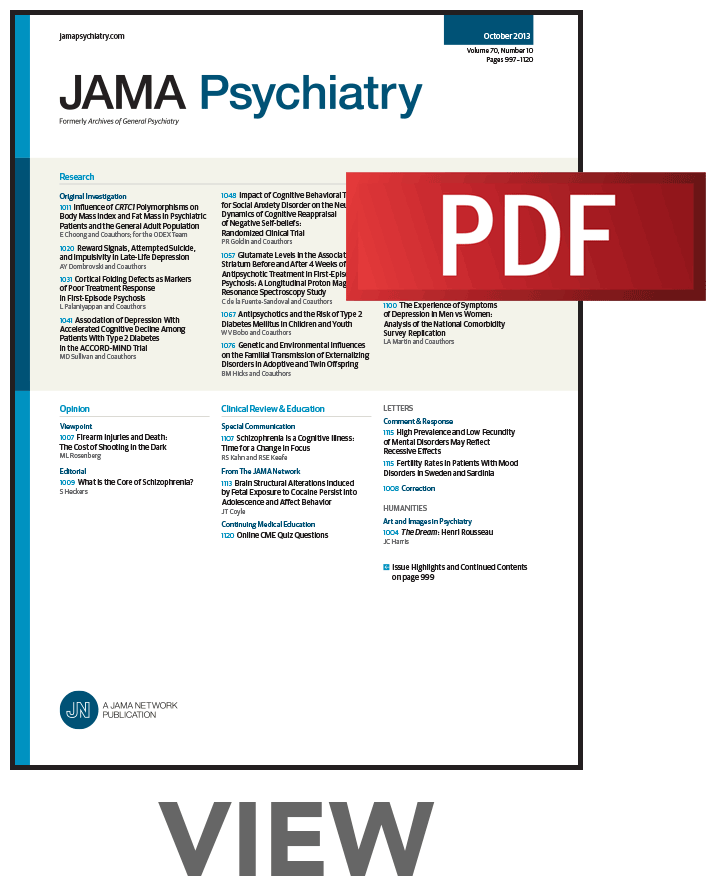ANK3作为一种新的基因生物标记物在难治性抑郁症中的作用:开明随机临床试验
IF 17.1
1区 医学
Q1 PSYCHIATRY
引用次数: 0
摘要
该研究首次成功地在精神病学前瞻性研究中使用遗传生物标志物来选择潜在的应答者。Liafensine是一种三重再摄取抑制剂,可能成为治疗难治性抑郁症(TRD)的一种新的精准药物,这是一个主要的未满足的医疗需求。目的:在一项临床试验中,确定ank3阳性TRD患者与安慰剂相比,每日口服1mg和/或2mg利芬辛是否受益。设计、环境和参与者回顾性地发现了一种新的药物基因组生物标志物ANK3作为利芬辛疗效的预测因子。这项生物标志物引导、随机、双盲、安慰剂对照的2b期临床试验于2022年7月至2024年3月在58个地点进行,1967名患者被评估为合格,189名ank3阳性TRD患者被随机分组。主要的排除标准包括特定疾病、伴随用药或器官功能障碍。研究者、患者、评分者和赞助者对ANK3状态和治疗不知情。数据分析时间为2024年3月26日至4月23日。干预:患者按1:1:1的比例随机分配至每日一次口服利亚芬酸,1mg;每日一次口服利亚芬,2毫克;或口服安慰剂,每日一次。主要结局和测量主要结局是Montgomery-Åsberg抑郁评定量表(MADRS)从基线到第42天的总分变化。结果189例ank3阳性TRD患者中,188例接受了研究药物治疗(平均[SD]年龄43.2[14.8]岁,119例[63.3%]女性),186例至少接受了1次研究药物治疗并进行了1次随机化后疗效评估。这些患者的平均(SE) MADRS评分变化为利亚芬组(包括1 mg和2 mg剂量)为-15.4(0.9),而安慰剂组为-11.0(1.3)(平均治疗差异为-4.4;95% CI, -7.6至-1.3;P = 0.006)。在所有次要终点也观察到统计学上显著的改善。不良事件是可以容忍的,有意义的事件发生率低。不良事件导致停药的患者有5例(4.0%)接受利亚芬,9例(14.1%)接受安慰剂。结论和相关性对于ANK3阳性TRD患者,利芬辛有效且耐受性良好,与安慰剂相比具有临床意义和统计学意义的改善,表明ANK3可作为利芬辛的预测性遗传生物标志物。这代表了精神病学中第一个成功的前瞻性遗传生物标志物引导试验。临床试验注册号:NCT05113771。本文章由计算机程序翻译,如有差异,请以英文原文为准。
ANK3 as a Novel Genetic Biomarker for Liafensine in Treatment-Resistant Depression: The ENLIGHTEN Randomized Clinical Trial.
Importance
This study represents a first successful use of a genetic biomarker to select potential responders in a prospective study in psychiatry. Liafensine, a triple reuptake inhibitor, may become a new precision medicine for treatment-resistant depression (TRD), a major unmet medical need.
Objective
To determine whether ANK3-positive patients with TRD benefit from a 1-mg and/or 2-mg daily oral dose of liafensine, compared with placebo, in a clinical trial.
Design, Setting, and Participants
A novel pharmacogenomic biomarker, ANK3, was discovered as a predictor of liafensine's efficacy retrospectively. In this biomarker-guided, randomized, double-blind, placebo-controlled, phase 2b clinical trial conducted at 58 sites from July 2022 through March 2024, 1967 patients were assessed for eligibility and 189 ANK3-positive patients with TRD were randomized. Key exclusion criteria included specified disorders, concomitant medications, or organ dysfunction. Investigators, patients, raters, and sponsors were blinded to ANK3 status and treatment. Data analysis was performed from March 26 to April 23, 2024.
Interventions
Patients were randomized 1:1:1 to once-daily oral liafensine, 1 mg; once-daily oral liafensine, 2 mg; or oral placebo once daily.
Main Outcomes and Measures
The primary outcome was the Montgomery-Åsberg Depression Rating Scale (MADRS) total score change from baseline to day 42.
Results
Of the 189 ANK3-positive patients with TRD who were randomized, 188 received study drug (mean [SD] age, 43.2 [14.8] years; 119 [63.3%] female), and 186 had at least 1 dose of study drug and 1 postrandomization efficacy evaluation. The mean (SE) MADRS score change in these patients was -15.4 (0.9) for liafensine (including both 1- and 2-mg doses) vs -11.0 (1.3) for placebo (mean treatment difference, -4.4; 95% CI, -7.6 to -1.3; P = .006). Statistically significant improvements were also seen in all secondary end points. Adverse events were tolerable, with low rates of meaningful events. Adverse events leading to discontinuation of treatment occurred in 5 patients (4.0%) receiving liafensine and 9 (14.1%) receiving placebo.
Conclusions and Relevance
Liafensine was efficacious and well tolerated in ANK3-positive patients with TRD, with clinically meaningful and statistically significant improvements over placebo suggesting ANK3 as a predictive genetic biomarker for liafensine. This represents a first successful prospective genetic biomarker-guided trial in psychiatry.
Trial Registration
ClinicalTrials.gov Identifier: NCT05113771.
求助全文
通过发布文献求助,成功后即可免费获取论文全文。
去求助
来源期刊

JAMA Psychiatry
PSYCHIATRY-
CiteScore
30.60
自引率
1.90%
发文量
233
期刊介绍:
JAMA Psychiatry is a global, peer-reviewed journal catering to clinicians, scholars, and research scientists in psychiatry, mental health, behavioral science, and related fields. The Archives of Neurology & Psychiatry originated in 1919, splitting into two journals in 1959: Archives of Neurology and Archives of General Psychiatry. In 2013, these evolved into JAMA Neurology and JAMA Psychiatry, respectively. JAMA Psychiatry is affiliated with the JAMA Network, a group of peer-reviewed medical and specialty publications.
 求助内容:
求助内容: 应助结果提醒方式:
应助结果提醒方式:


